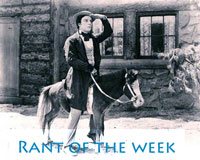
The ego of Dustin Hoffman:
"Dustin [Hoffman] told me that if
the director wants you to do something, and it doesn't feel right, don't do
it. Do what you want. It was nice to hear it from a vet.” Canadian
actress Liane Balaban kindly informing directors everywhere just who will
make the final decisions on the set.
Hoffman, whose own career has steadily descended into sustained
mediocrity (quick: tell me the last really great film he was in), hasn't
created a memorable character since... well, "Tootsie". And even that
was implausible-- they insisted on an actor completely physically unsuited
for a transgender role because the actor was famous. The same goes for
Robin Williams in "Mrs. Doubtfire".
Is Dustin Hoffman still a good actor? I don't think so. Watch
Phillip Seymour Hoffman for a comparison. You can believe, at times,
that Phillip S. Hoffman is the character he is playing. It's very hard
to see Dustin Hoffman without thinking right away, "that's an actor in the
twilight of his career".
I am presently enjoying the mini-series "John Adams" from HBO. Paul Giamatti
plays Mr. Adams, and Laura Linney his wife, Abigail. It's a superb series-- I
recommend it. It's marred, in my mind, by only one thing: Paul Giamatti's
bizarre performance.
Once upon time, actors learned techniques, for voice and gesture, intonation
and rhythm, and how to evoke character. This worked very well on the
stage, where a large number of people had to not only see you, but hear you.
In the movies, however, the excessive embrace of technique sometimes led to
ridiculous results--look at "Dr. Zhivago", for example. The "drama"--
especially during scenes that were supposed to be extremely emotional-- is, by
today's standards, stiff and constrained. Clearly, the actors are applying
technique, not instinct, to their performance. Watch Marlene Dietrich in
"Witness for the Prosecution". It's hard to believe this performance got past
the director and into the final cut. They make the formal gestures, but you can
see that there is no intensity or spontaneity in their faces-- as there would be
in real life. It's like those stage kisses still often used-- the illusion
is temporarily shattered.
Along came "the method", popularized by Lee Strasburg at the Actor's Studio
in New York in the 1930's, and, later . Strasberg, in turn, picked up the
idea from Konstantin Stanislavski, the great Russian actor. In the words of
wiki:
In Stanislavski's 'system' the actor analyzes deeply the motivations and
emotions of the character in order to personify him or her with psychological
realism and emotional authenticity. Using the Method, an actor recalls emotions
or reactions from his or her own life and uses them to identify with the
character being portrayed.
Now, I personally can't remember which is "sense" memory and which is
"emotional" memory and what the Meisner technique is, but suffice to say
they are all variations on the idea that one should mumble one's lines so
that nobody in the audience can understand what you say and, therefore, will
conclude that you are incredibly deep.
This is not all bad. Some of the most compelling performances of the past 30
years have come from method actors. And some of the worst.
The problem is this: Marlon Brando was a method actor. Marlon Brando used the
method to arrive at a character, in the movie "On the Waterfront", who happened
to be inarticulate and shy. Brando mumbled. Brando received widespread acclaim
and a new era of realism was heralded in. Therefore, great acting consists
of mumbling.
So we have Brad Pitt and Cate Blanchett and-- worst of all of them-- Ryan
Gosling. All mumbling and whispering and looking painfully
introverted as they do their best imitation of what they think made Brando successful: mumble. It's as if an athlete came to the
conclusion that the way to train for a race was to practice ascending the podium.
[2011-03: Just saw Ryan Gosling in "Blue Valentine". No actor of his
generation is less fun to watch than he is. I'm not saying he can't act--
it just isn't fun to watch.]
Even when your character is in a large room full of people to whom he is trying to speak: mumble softly. Even when the character
you are speaking to is talking normally because otherwise you couldn't hear him. Mumble anyway-- he'll know what you said because
he has a script.
So we have the spectacle of Paul Giamatti-- who is not a bad actor, by the way-- whispering to his fellow revolutionaries-- and
being close-miked in order to be audible. You can actually hear them change over to different miking when he speaks. Why? What
has possessed the man to such ridiculous lengths? To make his character more
"real" he makes him utterly implausible and, at times, ridiculous. It
hurts every scene he's in... except, when he and his wife are in bed together-- the only time his vocal mannerisms make sense.
There are obvious reasons for an actor's preference for "the Method", especially for actors who are more talented--
at least, more ambitious-- than average: the
method relies on the actor ransacking his own memories and emotions to evoke the character's actions and expressions. When an
actor takes his "art" seriously, it helps to be able to explain that he or she has tapped into some incredibly deep emotional
experiences in order to portray the character required. He's deep; I'm deep; we're all deep. You like me? You really like me?
I actually don't mind the method, when sensibly applied.
If you watch enough Leslie Howard and Richard Burton, you might start
longing for "the Method".
But you don't see Phillip Seymour Hoffman whispering when his character
is speaking to a large gathering. The Method has its limits.
All Contents Copyright
© Bill Van Dyk
2009 All Rights Reserved
Font: Verdana


